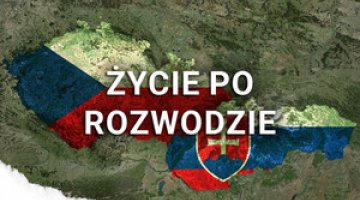Ambitious plans of the new Czech government
Final work on the priorities of the new centre-right government programme is being done in the Czech Republic. The coalition is made up of the Civic Democratic Party (ODS), TOP 09 and Public Affairs (VV), which in the election of 28th–29th April acquired a majority in the Chamber of Deputies. The priority of the government currently being formed by the leader of ODS, Petr Necas - who on 28th June received his nomination as prime minister - will be to repair public finances, to complete pension reform and to fight corruption. The parties have already agreed on the names of the candidates for ministerial roles and they are to receive nominations from the president next week.
The centre-right coalition has a majority of 118 votes in the 200-person Chamber of Deputies and may count on the favour of President Vaclav Klaus. However, the government’s stability is going to be weakened by the ambitions of the leaders of the coalition parties competing for the leadership on the right of Czech political scene.
Coalition negotiations
Following the election, the conservative ODS and TOP 09 along with centrist Public Affairs have appointed a number of expert teams whose objective was to develop thorough plans for the future government and a division of offices in the government and parliament. During the negotiations Prime Minister Necas and ODS had to yield to their coalition partners who, despite a weaker electoral result managed to force through most of their demands. ODS suffered two prestige defeats. The first one refers to the appointment of the Minister of Interior, taken up by the leader of Public Affairs, Radek John. His party, closely related to the largest security agency the Czech Republic (ABL), threatened that without this nomination it would not enter the government. The second defeat regards the Ministry of Finance, a key ministry in view of the planned reforms. Despite ODS’s resistance, it is going to be led by one of the TOP 09 leaders - Miroslav Kalousek. In both these ministries ODS is going to appoint the offices of deputy ministers, which is to help the prime minister to maintain control over them. The solution may, however, be a source of competence disputes. Ultimately ODS, apart from the prime minister, will be represented by five ministers, TOP 09 will direct five ministries and VV – four (see Appendix).
Ambitious savings plans
The new government’s main objective is to fight the deficit in public finances. The coalition parties have decided to attempt to limit last year’s level of 5.93% GDP to 4.6% GDP in 2011, and to reduce the deficit to 3% two years later. Thus one of the convergence criteria is to be met; however the cabinet does not intend to determine the date of introducing the common European currency. The condition for limiting the deficit is to cut the country’s expenses substantially. Next year the Ministry of Finances is planning to save 2.1 billion euros, mainly through limiting social benefits and abolishing tax reliefs. At the same time the government wants to stimulate economic recovery through a liberalisation of the labour law.
In the long run the new government is planning system reforms, including the completion of the pension reform and the introduction of fees for higher education studies. According to the coalition leaders, the fight against corruption, such as the tightening of punishments, the introduction of the institution of state witnesses and greater control of civil servants may also bring great savings. One of the very few areas not included in the coalition’s plans of cost-cutting is education. Centre-right leaders decided to shift more than 82 million euros from the Ministry of Defence to the Ministry of Education, thus fulfilling VV’s election promises. The cuts are also to omit government’s expenses on infrastructure projects.
Other arrangements
Energy issues occupy a very important place in the new government’s plans. It is going to focus on the development and modernisation of nuclear power plants in Temelin and Dukovany. Vaclav Bartuska, who until now held the office of the Special Representative for Energy Security at the Ministry of Foreign Affairs, was appointed the government representative responsible for these issues. Contrary to the previous cabinet, the new government is planning to maintain limits on brown coal output in those areas where it is controversial.
The coalition arrangements regarding foreign affairs seem to be quite general. Karel Schwarzenberg of TOP 09 who has been appointed as the new minister of Foreign Affairs has announced first of all a continuation of the previous policy – i.e. efforts to strengthen the North Atlantic Treaty and to take good care of the interests of the EU’s new members. The government decided to cancel the office of the minister for European Affairs. Most likely EU-related issues will end up as part of the competences of the Ministry of Foreign Affairs, which would additionally strengthen TOP 09’s position against ODS. During the negotiations it was also confirmed that the coalition will endeavour to keep the Czech Republic excluded from the binding force of the EU’s Charter of Fundamental Rights. This step must be seen as a gesture towards President Vaclav Klaus.
The coalition also wants to initiate changes in the political system. It is going to push for the introduction of a general presidential election and a limitation in the possibility of applying non-constructive votes of no confidence. Work on the introduction of the option to vote via the Internet has been announced. The new centre-right coalition is two deputies short of having a constitutional majority, which is why future changes will require the support of the opposition.
Conclusions
These substantial budgetary savings plans came as no surprise since they refer to announcements formulated by the coalition parties before the election. One must expect that the most numerous grouping in the Chamber of Deputies – the Czech Social Democratic Party (CSSD) – is going to seek support before this autumn’s local government elections by criticising the savings projects and mobilising e.g. trade unions and student organisations. The coalition, however, has a strong majority in parliament and may count on the president’s support. The success of the planned reform of public finances will depend to a large extent on the dynamics of the economic recovery in EU states, as exports make up 80% of Czech GDP
Appendix
Division of portfolios
Civic Democratic Party (ODS):
Prime Minister: Petr Necas – ODS leader, former Minister of Defence, then Deputy Prime Minister and Minister of Labour in Mirek Topolanek’s cabinet
Ministry of Defence: Alexandr Vondra – diplomat, former Minister of Foreign Affairs and Deputy Prime Minister for European Affairs during the Czech presidency in Mirek Topolanek’s cabinet
Ministry of Industry and Commerce: Martin Kocourek – ODS economy expert, chairman of the supervisory board at the state-owned corporation CEZ
Ministry of Agriculture: Ivan Fuksa – former Deputy Minister of Finance, deputy member of a local government, deputy chairman of the supervisory board of CEZ
Ministry of Justice: Jiri Pospisil – ODS deputy leader, former Minister of Justice in Mirek Topolanek’s cabinet
Ministry of the Environment: Pavel Drobil – ODS deputy leader, member of supervisory board of the state-owned firm Forests of the Czech Republic, supporter of nuclear power
TOP 09:
Ministry of Finance: Miroslav Kalousek – co-founder and deputy leader of TOP 09, former Deputy Minister of Defence, later Minister of Finances in Mirek Topolanek’s cabinet
Ministry of Culture: Jiri Besser – medical doctor, former member of local government, the only member of government who used to be in the communist party (for a short period in 1989)
Ministry of Labour and Social Affairs: Jaromir Drabek – TOP 09 deputy leader, former head of the Czech Chamber of Commerce
Ministry of Foreign Affairs: Karel Schwarzenberg – TOP 09 leader, former head of President Vaclav Havel’s office and Minister of Foreign Affairs in Mirek Topolanek’s cabinet
Ministry of Health: Leos Heger – former head of the University Hospital in Hradec Kralove
Public Affairs (VV):
Ministry of Regional Development: Kamil Jankovsky – businessman, VV economy expert, one of the party’s main sponsors
Ministry of the Interior: Radek John – VV leader, former popular investigative journalist for a private TV channel
Ministry of Education, Youth and Sports: Josef Dobes – VV deputy leader, party’s expert on educational issues, connected with the ABL security agency
Ministry of Transport: Vit Barta – former owner of the largest Czech security agency - ABL (gave his shares to his brother), one of the party’s main sponsors





